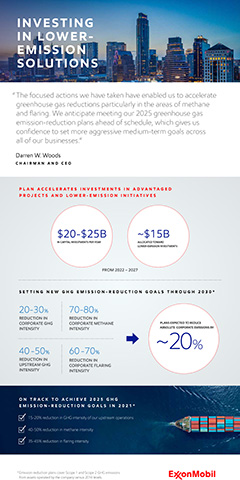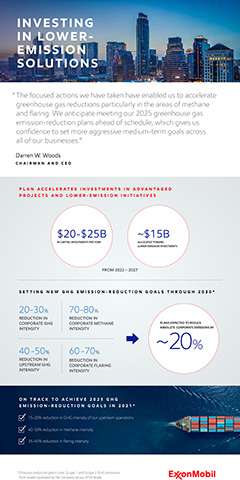IRVING, Texas--(BUSINESS WIRE)--ExxonMobil (NYSE: XOM) said today it has finalized corporate plans, which increase spending to $15 billion on greenhouse gas emission-reduction projects over the next six years while maintaining disciplined capital investments in its industry-leading portfolio. The plans support the corporate strategy of continued structural cost savings, investment in low-cost-of-supply and lower-emission products, and further portfolio high-grading, positioning the company to double earnings and cash flow by 2027 versus 2019.
The company also announced it is on track to meet its 2025 greenhouse gas emission-reduction plans by year-end 2021, four years ahead of schedule. In addition, ExxonMobil has developed more aggressive plans for further Scope 1 and Scope 2 reductions through 2030, consistent with Paris Agreement pathways.
Capital Plans
ExxonMobil plans to maintain capital investments in the range of $20-$25 billion per year through 2027 with flexibility to adjust to adverse market conditions or changes in policy and technology for low-emissions projects.
“The restored strength of our balance sheet and improved financial outlook support accelerating investment in our industry-advantaged, high-return projects, and a growing list of financially accretive lower-emission business opportunities,” said Darren Woods, chairman and chief executive officer. “Our strategy is designed to create shareholder value by leveraging our competitive advantages while maintaining flexibility to respond to future policy changes and technology advances associated with the energy transition.”
Projected growth of cash flow and earnings in the Upstream business results from aggressive cost reductions and progressing advantaged investments in low-cost-of-supply projects in Guyana, Brazil, and the Permian Basin in the United States. More than 90% of Upstream planned capital investments through 2027 are expected to generate returns of greater than 10% at prices less than or equal to $35 per barrel of oil equivalent, while reducing Upstream GHG emissions intensity by 40-50% through 2030, compared to 2016 levels.
Downstream and Chemical earnings and cash flow growth plans are focused on high-return projects, which are expected to double the volume of valuable performance chemicals and lower-emission fuels and lubricants. The company will leverage its industry-leading manufacturing scale, integration, and technology position to high-grade its portfolio and reduce costs, while optimizing operations and leveraging the capabilities of the Low Carbon Solutions business to reduce greenhouse gas emission intensity at operated facilities.
Increased cash flow and earnings enable both further debt reduction and returns to shareholders. To date in 2021, the company has repaid $11 billion in debt and expects to be comfortably within the range of its targeted debt–to-capital ratio of 20-25% by year-end. It has also announced a $10 billion share-repurchase program over 12-24 months that will commence in 2022, and it increased its annual dividend payment for the 39th consecutive year.
Greenhouse Gas Emission Reduction Plans
As part of its plan, ExxonMobil has committed $15 billion for lower-emission investments through 2027. These investments will include a balance between projects to reduce greenhouse gas emissions from existing operations and increased investments in the Low Carbon Solutions business. The same capabilities, technical strengths and market experience that support base energy and chemical businesses will help drive commercial growth opportunities for carbon capture and storage, biofuels and hydrogen where supportive policies currently exist and provide for strong returns.
ExxonMobil is on track to exceed its 2025 greenhouse gas emission-reduction plans announced in December 2020. The company anticipates year-end 2021 results to show a reduction of 15-20% in greenhouse gas intensity from Upstream operations compared to 2016 levels, four years ahead of schedule. This is supported by an anticipated reduction of 40-50% in methane intensity and 35-45% in flaring intensity compared to 2016.
“The focused actions we have taken have enabled us to accelerate greenhouse gas reductions particularly in the areas of methane and flaring,” said Woods. “We anticipate meeting our 2025 greenhouse gas emission-reduction plans ahead of schedule, which gives us confidence to set more aggressive medium-term goals across all of our businesses.”
The new medium-term greenhouse gas reduction plans for 2030 are consistent with Paris Agreement-aligned pathways and include the following:
2030 Greenhouse Gas Emission-Reduction Plans
- 20-30% reduction in corporate-wide intensity
- 40-50% reduction in Upstream intensity
- 70-80% reduction in corporate-wide methane intensity
- 60-70% reduction in corporate-wide flaring intensity
These new plans include actions that are expected to reduce absolute corporate-wide greenhouse gas emissions by approximately 20%. The company also reaffirms it plans to achieve the goals of the World Bank for zero routine flaring no later than 2030.
ExxonMobil’s 2030 GHG emission-reduction plans cover Scope 1 and Scope 2 greenhouse gas emissions from assets operated by the company compared to 2016 levels. For assets not operated by the company, it will work with its equity partners and strive to achieve comparable results.
Supporting materials for this press release are available on the Investor Relations page of ExxonMobil.com.
About ExxonMobil
ExxonMobil, one of the largest publicly traded international energy companies, uses technology and innovation to help meet the world’s growing energy needs. ExxonMobil holds an industry-leading inventory of resources, is one of the largest refiners and marketers of petroleum products, and its chemical company is one of the largest in the world. To learn more, visit exxonmobil.com, the Energy Factor and Carbon capture and storage | ExxonMobil.
Follow us on Twitter and LinkedIn.
Cautionary Statement
Statements of future events or conditions in this press release are forward-looking statements. Actual future results, including financial and operating performance; potential earnings, cash flow, and rates of return; project plans, timing, costs, and capacities; realization and maintenance of cost reductions, opex savings and structural efficiencies; integration benefits; emissions intensity and absolute emissions reductions; implementation and outcomes of carbon capture and storage projects, renewable fuel projects, and other lower-carbon business efforts; price and margin assumptions; dividends and shareholder returns including the timing and amounts of share repurchases, cash and debt balances, and capital expenditures; resource recoveries and production rates; and product sales levels and mix could differ materially due to a number of factors including global or regional changes in oil, gas, petrochemicals, or feedstock prices, differentials, or other market or economic conditions affecting the oil, gas, and petrochemical industries and the demand for our products; the outcome of competitive bidding and project wins; regulatory actions targeting public companies in the oil and gas industry; changes in local, national, or international laws, regulations, and policies affecting our business, including with respect to the environment or the development and transportation of our products; taxes, trade sanctions, and actions taken in response to pandemic concerns; the pace of regional and global economic recovery from the pandemic and the occurrence and severity of future outbreaks; the ability to realize efficiencies within and across our business lines and to maintain cost reductions without impairing our competitive positioning; the outcome and timing of exploration and development projects; reservoir performance; timely completion of construction projects; war and other security disturbances; actions of consumers and changes in consumer preferences; opportunities for and regulatory approval of investments or divestments that may arise, including satisfaction of conditions precedent under applicable agreements; the outcome of our or competitors’ research efforts and the ability to bring new technology to commercial scale on a cost-competitive basis; the development and competitiveness of alternative energy and emission reduction technologies; unforeseen technical or operating difficulties including the need for unplanned maintenance; and other factors discussed here and in Item 1A. Risk Factors of our Annual Report on Form 10-K and under the heading “Factors Affecting Future Results” available through the Investors page of our website at exxonmobil.com. All forward-looking statements are based on management’s knowledge and reasonable expectations at the time of this press release and we assume no duty to update these statements as of any future date.
Forward-looking statements contained in this press release regarding the potential for future earnings, cash flow, dividends and returns, including statements regarding future earnings potential and returns in the Upstream, Chemical and Downstream segments and in our lower-carbon investments, are not forecasts of actual future results. These figures are provided to help quantify for illustrative purposes management’s view of the potential future results and goals of currently-contemplated management plans and objectives over the time periods shown, calculated on a basis consistent with our internal modeling assumptions. In calculated future prices, we assume $60/bbl Brent crude prices and natural gas prices used are consistent with management’s internal price assumptions for the relevant natural gas markets relative to that crude price. All crude and natural gas prices for future years are adjusted for inflation from 2021. Downstream and Chemical margins reflect annual historical averages for the 10-year period from 2010—2019 unless. These assumptions are not forecasts of actual future market conditions. For this purpose we have assumed future demand growth in line with our internal planning basis, and that other factors including factors management does not control such as applicable laws and regulations (including tax and environmental laws), interest rates, and exchange rates remain consistent with current conditions for the relevant periods. These calculations do not attempt to model potential future COVID-19 outbreaks or recoveries.
ExxonMobil-operated emissions, reductions and avoidance performance data are based on a combination of measured and estimated data using best available information. Calculations are based on industry standards and best practices, including guidance from the American Petroleum Institute (API) and IPIECA. The uncertainty associated with the emissions, reductions and avoidance performance data depends on variation in the processes and operations, the availability of sufficient data, the quality of those data and methodology used for measurement and estimation. Changes to the performance data may be reported as updated data and/or emission methodologies become available. ExxonMobil works with industry, including API and IPIECA, to improve emission factors and methodologies. Emissions, reductions and avoidance estimates from non-ExxonMobil operated facilities are included in the equity data and similarly may be updated as changes to the performance data are reported. ExxonMobil’s plans to reduce emissions are good faith efforts based on current relevant data and methodology, which could be changed or refined.
The term “Upstream planned capital investments” as used in this release refers to projects that bring on new volumes with returns calculated on a money-forward basis. The term “performance chemicals” as used in this release refers to Chemical products that provide differentiated performance for multiple applications through enhanced properties versus commodity alternatives and bring significant additional value to customers and end-users. The term “project” as used in this release can refer to a variety of different activities and does not necessarily have the same meaning as in any government payment transparency reports.
This release summarizes highlights from ExxonMobil’s December 1, 2021 update for its corporate plans. For more information concerning the forward-looking statements, defined terms, and other information contained in this release, please refer to the complete presentation (including important information contained in the Cautionary Statement and Supplemental Information sections of the presentation) on the Investors section of our website at exxonmobil.com. Definitions and additional information concerning certain terms used in this release are also provided in the Frequently Used Terms available on the Investor page of our website at www.exxonmobil.com under the heading News & Resources.




